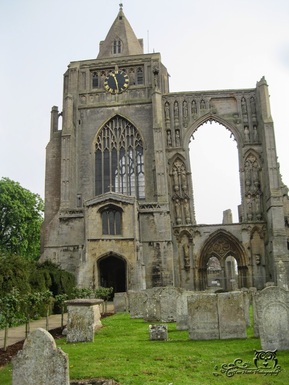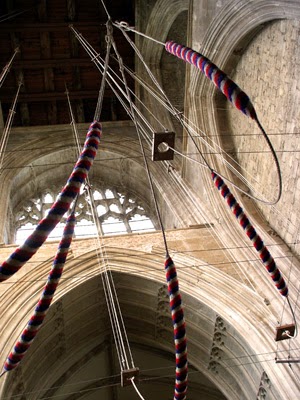The great bell was cast on the instructions of Abbot Turketyl and named Guthlac after one of the two saints the abbey is dedicated to. Egelric, who was abbot from 975 to 984 added six more bells whose names were Bartholomew, Beccelm, Turketyl, Tatwin, Pega and Bega.
These seven bells were housed in a central tower that, in 1091, was destroyed by fire as was a smaller belfry many years later. The tenor bell, cast in 1430, is one of six bells at Crowland, not only are they unique, but they were the first tuned peal to be heard here in England, also the sound of them ringing were one of the first to be broadcast to the nation on radio in 1924.
The bell ropes, seen in my photograph below, have one of the longest draws in the country being ninety feet long.
"At this period, there happened in our monastery a circumstance of everlasting remembrance, which some of the most intelligent, even, ascribed to a wondrous miracle. The greater bell-tower had been newly built in the western part of the church, in which it was intended that the bells before-mentioned should, by the skill of the carpenters, be hung. At this time it was not covered in at the very top, nor was it in any way closed by the intervention in it of any lower floor. Having put together, on the ground below, a certain machine for the purpose of winding and drawing, they endeavoured to fix in the summits of the walls an immense beam, held by ropes and pulleys, to act as a supporter of the whole work. By dint of great efforts on the part of those winding, the beam had been now raised nearly fifty feet from the ground, and was hanging poised aloft, when, on a sudden, the tackle proving unequal to the strain of such an immense mass, began to give way. At the same moment, the ropes burst asunder, and the beam, falling to the ground with a loud crash, broke the whole fabric to atoms that lay below. There seemed no chance of escape whatever for the men, nearly twenty in number, who were labouring below and were now placed almost at the very verge of death; nor would it have been of any use for them to fly, seeing that the beam in its length across equalled the square space between the walls. However, the Divine mercy instantly regarded them thus threatened by a peril so terrific, and smitten with the greatest consternation at so unlooked-for an event; for the breaking down of so vast a mass did not crush one of them, and its precipitate fall did not the slightest injury to a single individual. Oh instance of the Divine grace, deservedly to be lauded and extolled! Oh, how glorious, too, the merits of our father Guthlac! Who could possibly withhold himself from uttering the praises of God?"



 RSS Feed
RSS Feed
